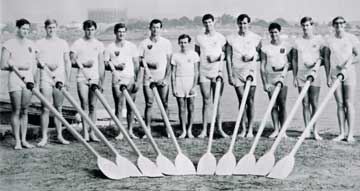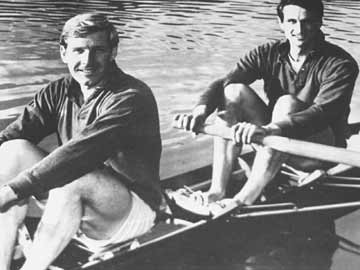Olympic Games—Mexico City 1968
These Olympic Games were highlighted by altitude issues. The rowing was conducted on a man-made canal at Cuemanco near Xochimilco outside Mexico City in excellent conditions but at 7300 feet altitude. There were about 40 cases of altitude sickness where competitors collapsed during or after racing, including the Australian coxless pair.
This was the first Olympic regatta where East and West Germany raced as separate teams. The 7th placed Romanian coxed four contained Reinhold Batschi, Australian rowing's head coach for many years and 2004 Olympic coach.

Men's Eight Squad in Sydney
Selection
The total Australian Olympic team was restricted to 180 people so rowing was well represented in view of the 1964 results. One coach and a rowing team manager were also permitted.
The Interstate Championships were due to be held at Ballarat but due to a severe drought, water levels were too low. NSW agreed to conduct the event at Penrith. The NSW crew won the King's Cup race but only by one second to Victoria. Kert of Queensland won the sculls from Edwards of Victoria, Winter of Tasmania and Reddell of NSW. Subject to grading and final selections, the NSW crew was to be the Australian crew and Kert to be the sculler.
Phil Cayzer (NSW) is credited with the recruiting of several of the NSW rowers to Sydney Rowing Club to create the crew and also with much of the subsequent coaching of the eight both in Australia and Mexico.
The selections for the other five Olympic events were conducted at the National Championships at Murray Bridge in South Australia. The outstanding performers at the regatta were Guest and Ramage in the coxless pair. They were graded second behind the eight.
The selectors also believed that the coxed four of Graeme Boykett, John Harry, David Douglas, Stephen Gillon, cox Tom Daffy and coach Hubert Frederico were also of medal standing. This crew had won the North American Championships in 1967. However the restriction on numbers meant that they missed out.
Kert and the coxless four, which included Guest and Ramage, also missed out. The selections for the eight saw David Douglas and Bob Shirlaw being selected in place of John Nickson and John Clarke who became reserves.

Men's Coxless Pair
str David B Ramage & bow Paul M Guest
Australian Team
Men's Eight – Silver
- Bow: Robert A Shirlaw (NSW)
- 2: Gary M Pearce (NSW)
- 3: John R Ranch (NSW)
- 4: David G A Douglas (VIC)
- 5: Peter Dickson(NSW)
- 6: Joe R Fazio (NSW)
- 7: Michael D Morgan(NSW)
- Str: Alf W Duval (NSW)
- Cox: Alan G Grover (NSW)
- Coach: Alan R Callaway (NSW)
- Reserves: John H Nickson (NSW) & John E Clark (NSW)
Men's Coxless Pair – Seventh
- Bow: Paul M Guest (VIC)
- Str: David B Ramage (VIC)
Manager: Robert C Hemery (WA)
Selectors: Robert Aitken (VIC), Bill Wallace (SA) and
Maurice Grace (NSW).
Australia's Olympic Team Captain was Paul Guest.
Racing
Men's Eight
E1: 1st FRG, 2nd AUS, 3rd
E2: 1st NZL, 2nd
R1: 1st AUS, 2nd URS,
R2: 1st TCH, 2nd USA,
Final B: 7th GDR, 8th NED, 9th CAN, 10th GBR, 11th MEX, 12th JPN
Final: 1st FRG (Horst Meyer, Dirk Schreyer, Rudiger Henning, Wolfgang
Hottenrott, Lutz Ulbrocht, Egbert Hirschfelder, Jorg Siebert, Nikolaus
Ott, Gunther Tiersch) 6:07.00, 2nd AUS 6:07.98. 3rd URS (Zigmas Yukna,
Antanas Bogdanavichus, Vladimir Sterlik, Yosanas Yagelavichus, Alexandr
Martyschkin, Vitaytas Briedis, Valantin Hravtcchuk, Viktor Suslin, Yuri
Lorentson) 6:08.11, 4th NZL 6:10.43, 5th TCH 6:12.17, 6th USA 6:14.34
The Australians planned to settle down for the first 800 metres to conserve energy for the final sprint. The New Zealanders led for the first 1200 metres. The Germans, coached by the great Karl Adam, drew level and then passed them. The Soviets, after a slow start, reached third placing by the 1500 metre mark. The Australians, after having kept a low profile, made their move and moved up to the leading crews 100 metres from the line. In the final sprint the Germans held on by less than a second in front of the Australians. Boats continued to be an issue with the German boat being 34 kilograms lighter than any other boat.
Men's Coxless Pair
E1: 1st NED, 2nd DEN, 3rd GDR, 4th SUI, 5th ITA, 6th GER
E2: 1st AUT, 2nd FRA, 3rd POL, 4th MEX, 5th CUB, 6th CAN
E3: 1st USA, 2nd AUS, 3rd HUN, 4th URS, 5th FIN, 6th URU
R1: 1st GDR, 2nd AUS, 3rd HUN, 4th CAN, 5th FIN, 6th MEX
R2: 1st SUI, 2nd FRG, 3rd POL, 4th URU, 5th CUB – URS did not finish
SF1: 1st NED, 2nd AUT, 3rd SUI, 4th AUS, 5th ITA, 6th POL
SF2: 1st USA, 2nd DEN, 3rd GDR, 4th FRA, 5th HUN, 6th FRG
Final B; 7th AUS, 8th POL, 9th HUN, 10th ITA, 11th FRA, 12th FRG
Final: 1st GDR (Jorg Lucke, Hans-Jurgen Bothe) 7:26.56, 2nd USA (Lawrence
Hough, Philip "Tony" Johnson) 7:26.71, 3rd DEN (Peter Christiansen,
Ib Ivan Larsen) 7:31.84, 4th AUT 7:41.80, 5th SUI 7:46.79, 6th NED. (18
crews)
The Australians were content to come second in their heat to the silver medallist USA and to the gold medallists Germany in the repechage. In the semi-final, however they were almost a length in front at the 1800 metre mark when Ramage partially collapsed and three crews passed them. Some minor satisfaction was achieved with a win in the petite final.
Men's Single Scull
1st Henri Jan Wienese (NED) 7:47.80, 2nd Jochen Meissner (GER) 7:52.00, 3rd Alberto Demiddi (ARG) 7:57.19, 4th USA 8:00.51, 5th GDR 8:06.09, 6th GBR 8:13.76 (17 scullers)
Men's Double Scull
1st URS (Anatoly Sass, Alekandr Timoshinin) 6:51.82, 2nd NED (Leendert Frans van Dis, Henricus Droog) 6:51.80, 3rd USA (William Maher, John Nunn) 6:54.21, 4th BUL 6:58.48, 5th GDR 7:04.92, 6th GER 7:12.20 (13 crews)
Men's Coxed Pair
1st ITA (Primo Baran, Renzo Sambo, Bruno Cipolla) 8:04.81, 2nd NED (Herman Suselbeek, Hadriaan van Nes, Roderick Rijnders) 8:06.80, 3rd DEN (Jorn Krab, Harry Jorgensen, Preben Krab) 8:08.07, 4th GDR 8:08.22, 5th USA 8:12.60, 6th FRG 8:41.51. (18 crews)
Men's Coxless Four
1st GDR (Frank Forberger, Dieter Grahn, Frank Ruhle, Dieter Schubert) 6:39.18, 2nd HUN (Zoltan Melis, Gyorgy Sarlos, Jozsef Csermely, Antal Melis) 6:41.64, 3rd ITA (Renato Bosatta, Tullio Baraglia, Pier Angelo, Conti Manzini, Abramo Albini), 4th SUI 6:45.78, 5th USA 6:47.70, 6th FRG 7:08.22. (11 crews)
Men's Coxed Four
1st NZL (Richard Joyce, Dudley Storey, Ross Hounsell Collinge, Warren Cole, Simon Dickie) 6:45.62, 2nd GDR (Peter Kremtz, Roland Gohler, Manfred Gelpke, Klaus Jakob, Dieter Semetzky) 6:48.20, 3rd SUI (Denis Oswald, Hugo Waser, Peter Bolliger, Jacob Grob, Gottlieb Frohlich) 6:49.04, 4th ITA 6:49.54, 5th USA 6:51.41, 6th URS 7:00.00. (13 crews)
New Zealand won their first ever Olympic rowing medal in the coxed four ahead of the East Germans in second place and the Swiss crew in third place. This Swiss crew included the current FISA President and IOC member Denis Oswald.

